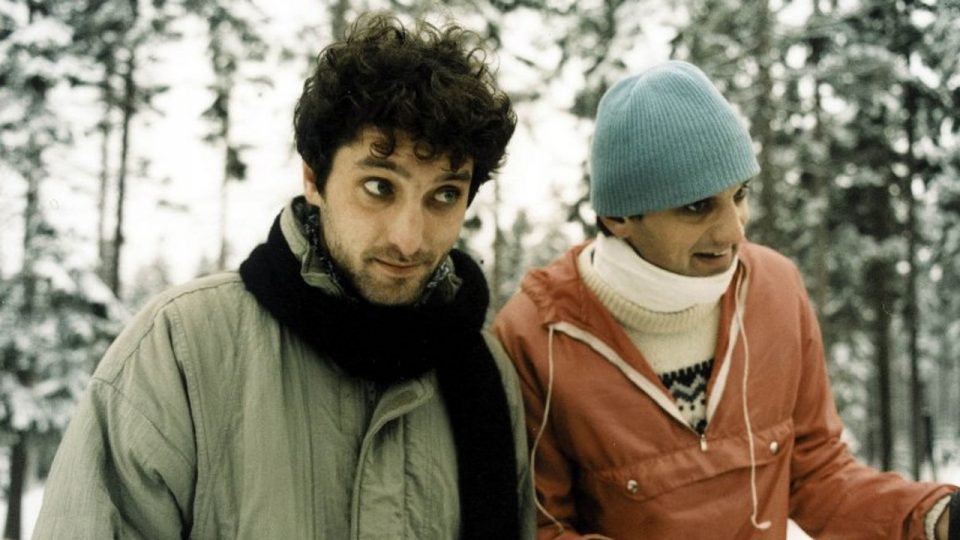The protagonists of Věra Chytilová’s last Normalisation-era film could sing along with two Maries from her film Daisies (Sedmikrásky, 1966) that when the whole world is rotten, they shall be rotten too. They even have their own anthem whose lyrics gave this mischievous generational morality tale its Czech title. To cover their frustration from work and personal lives, they indulge in games with the same nihilistic resignation as the two Maries. Their motto sums it all up: “The clock on the tower keeps chiming, fuck it all with its timing.” With their recitational style as if taken from the stage of the Sklep Theatre, they transform momentous as well as banal situations into a theatre performance. They cease playing their made-up roles only when they find out that one of them is HIV positive.
Tainted Horseplay (Kopytem sem, kopytem tam, 1988) may be the first Czechoslovak film openly addressing AIDS, but for Chytilová, the serious disease is mainly a metaphorical threat affecting characters who don’t actively defy social decline, but rather run away from it towards substitute activities. Work is a necessary evil for them. They come to life when they’re having fun. What comes after is of no interest to them. Their noncommittal horseplay, constituting in fact the first 90 minutes of the film, takes place in anticipation of a catastrophe signalised from the very beginning by skewed camera shots, cuts to details, image deformations and decentred composition in which the actors occupy the edges of the frame and their heads are often not even in the frame when talking.
The stylised poetics of the film is apparent already in its prologue depicting the formation of a human heart. Beginning with this scene, the colour red becomes a symbol of blood and corporeality; genesis and demise. In the form of a red dress, a table lamp and other props, the colour is present in almost every scene. It serves as a warning against the consequences of promiscuous revelry. Later in the film, when the whole group suspects they are all infected, each appears dressed in red at some point. At the end, only one remains in red. In opposition to the passionate red is blue. Its increasingly apparent presence marks the cooldown in relationships (which were never deep in the first place), isolation and the loss of libido.
The emptiness of the official culture and nonconformist remaining in pubertal games is expressed by a sequence of scenes rich in meaning. Externally, they are as disorganised as the lives of the three protagonists, and just like them, they serve no purpose. From one party to another, from one partner to another. The film may come across as an intensified variation of the legendary Men About Town (Světáci, 1969), but even though the worlds of the protagonists of Zdeněk Podskalský’s satire were also defined by fulfilling their own needs, they at least strived for something. Pepe, Dědek and František fit in the world of the cream of the society in Karlovy Vary from the very beginning. They know how to play their roles of wealthy “Westerners” appealing to the ladies willing to spend the night with them. And in this respect, they can’t upscale.
If the film had an explicitly defined goal from the beginning and escalated gradually instead of resembling a spiral wrapped in itself, it would betray the principles of the game defining the protagonists’ lives. They transform their drinking sprees, romantic involvements, and superficial relations into a game into which they invest all their energy and intellectual potential. It manifests itself in making up Dadaist puns and new words, such as “antisolar glasses.” The Sklep Theatre actors deliver their dialogues with the force of slam poetry evenings. The three anti-heroes have settled in their alter egos created to be able to face the dullness of the world so much so that beneath their forced masks there is nothing human left. Only a constantly ungratified body.
Just a few minutes before the film’s ending, after our attention is gripped by a whirlwind of seemingly provocative but essentially harmless games, this excited comedy turns into a comparably tense drama. Its bitter end resembles a hangover after a wild party. While amending the script by debutant Pavel Škapík, Věra Chytilová ironically reflected the moral degradation of late socialism and its poor taste, represented by videocassettes, parodies of its phraseology at a meeting of the Socialist Youth Union, and disco aerobics. But at the same time, she managed to create a vision of an early capitalist society with amorality, selfishness, opportunism, and masks covering spiritual emptiness. All this was still to be amplified by consumerism. The biggest hangover was to come a few years after the premiere.
Tainted Horseplay (Kopytem sem, kopytem tam, Czechoslovakia, 1988), director: Věra Chytilová, screenplay: Věra Chytilová, Pavel Škapík, director of photography: Jaroslav Brabec, music: Jiří Chlumecký, Jiří Veselý, cast: Tomáš Hanák, Milan Šteindler, David Vávra, Ivana Kuntová, Tereza Kučerová, Renata Beccerová, Bára Dlouhá, Chantal Poullain, Josef Kobr et al. Filmové studio Barrandov, 129 min.


